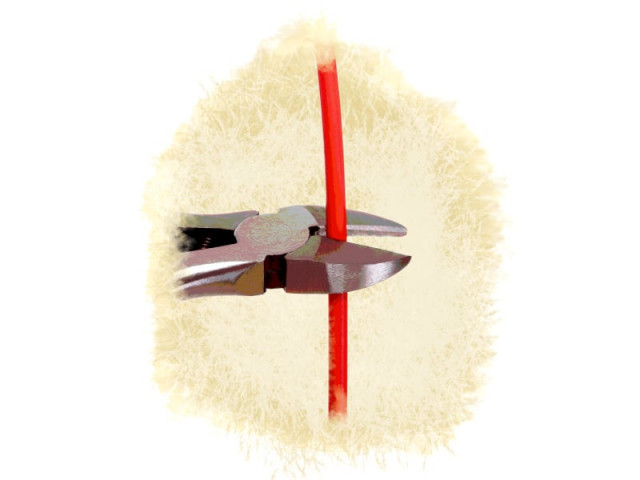Rampant electricity theft: Private sector defaulters to be prosecuted by NAB
Government to forward cases older than a year and a half to corruption watchdog.

Government to forward cases older than a year and a half to corruption watchdog. ILLUSTRATION: FAIZAN DAWOOD
As the country sinks deeper into the vortex of circular debt amid nationwide power outages, the federal government has decided to refer chronic private sector defaulters to the National Accountability Bureau (NAB) in order to ensure rapid recovery of electricity dues.
A decision to this effect was taken here on Saturday in an inter-ministerial meeting headed by Finance Minister Saleem Mandviwalla, less than two weeks before the government completes its five-year term.
“It has been decided that defaulters who haven’t paid their dues for over one and a half year will immediately be referred to NAB so that the authority can initiate recovery proceedings,” a finance ministry official said. “Out of the total outstanding dues of Rs222 billion against private consumers till date, an amount of over Rs100 billion has been due for the last two years,” he added.
These ‘running defaulters’ – as they are known as – are still receiving electricity: some by greasing the palms of power distribution companies’ staff, and others courtesy to their political positions, our sources said.
The Pakistan Electric Power Company has already separated the names of chronic defaulters from those whose arrears are less than a year old. Other CEOs of power distribution companies will submit their final lists by Monday, officials added.
On February 24, a rare countrywide blackout hit Pakistan, leaving 70% of its territory without electricity. The government has already ordered an inquiry into the even to determine its causes; meanwhile, the energy crisis has deepened further with most cities – even major urban centres like Islamabad – facing eight hours of load-shedding. Rural areas fare far worse, where power outages typically stretch more than twelve hours.
Throughout its tenure, the government has constituted many committees and panels – almost all headed by former finance minister Dr Abdul Hafeez Shaikh – but has not been able to come up with a meaningful solution to Pakistan’s energy woes.
According to various official and independent reports, the energy crisis stems from the gap between the cost of electricity generation and end-consumer prices, line losses due to both theft and obsolete transmission systems, and the government’s inability to recover power bills.
However, it is not only the private sector that indulges in power theft: government departments are equally to blame. Over Rs120 billion are due against the federal and provincial governments, to an official of the Ministry of Water and Power told The Express Tribune. Among these, the Sindh government ranks at the top of public sector defaulters.
Meanwhile, the federal government has also decided to use the avenue of the federal adjustor to recover dues from provinces, while also approaching them to amicably settle arrears, officials said.
According to finance ministry officials, outstanding inter-corporate debt has swelled to Rs428 billion excluding power subsidies. During the current fiscal year, the finance ministry has so far provided Rs235 billion subsidising power for consumers, with four months remaining till the end of the year. Alarmingly, that figure has already surpassed the budgeted allocation for 2013 of Rs185 billion by 27%.
Possible problems
According to an official, the decision to handing over recoveries to NAB might be challenged in the courts, as there is uncertainty over whether the NAB Ordinance, under which the NAB operates, allows the authority to recover electricity arrears.
Published in The Express Tribune, March 3rd, 2013.
Like Business on Facebook to stay informed and join in the conversation.



















COMMENTS
Comments are moderated and generally will be posted if they are on-topic and not abusive.
For more information, please see our Comments FAQ